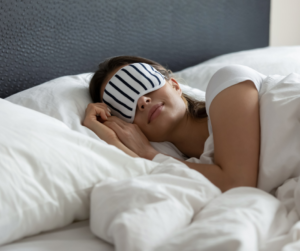By: Dr. Ryan Lee
 Life is busy and sometimes it feels like there is no time to sit back and relax, let alone sleep. Although it’s commonly shrugged off as something that can be lost or shortened, getting the right amount of sleep is vital to your overall health and well-being. The average adult needs 7-8 hours of sleep to properly experience the 4 to 5 sleep cycles and be well-rested. But if you’re struggling to get quality sleep, it’s time to consider some simple lifestyle changes that can have lasting effects on your sleep schedule. Getting more Zzz’s each night doesn’t have to be complicated—these 10 sleep tips from a chiropractor are super easy to put into practice and will help you get the rest you need.
Life is busy and sometimes it feels like there is no time to sit back and relax, let alone sleep. Although it’s commonly shrugged off as something that can be lost or shortened, getting the right amount of sleep is vital to your overall health and well-being. The average adult needs 7-8 hours of sleep to properly experience the 4 to 5 sleep cycles and be well-rested. But if you’re struggling to get quality sleep, it’s time to consider some simple lifestyle changes that can have lasting effects on your sleep schedule. Getting more Zzz’s each night doesn’t have to be complicated—these 10 sleep tips from a chiropractor are super easy to put into practice and will help you get the rest you need.
1) Establish a bedtime routine
It can be tough falling asleep at night, but following a regular bedtime routine can help. Like other routines, a bedtime routine builds good habits which teach your brain when it’s time to sleep. Performing the same routine every night teaches your brain that you’ll be sleeping soon and can relax, letting you sleep better. So start a routine that will help you prepare for a good night’s rest. For example, brush your teeth and go through your normal getting-ready-for-bed ritual and consider reading for 15 minutes. Whatever you do, make sure it is consistent so you’ll start building positive sleep associations.
2) Create a sleeping environment you enjoy
Our environment has everything to do with how we feel, and feeling comfortable can be especially important when you’re trying to get a good night’s rest. Make sure your room is clean, try bringing in some scents that promote relaxation (lavender is usually recommended), and don’t forget about temperature—that may mean opening windows during summer months and closing them during winter. While it may sound counterintuitive, it can actually help your body relax more if you expose yourself to cooler temperatures for a few hours before bedtime. If possible, keep your electronics out of reach; there’s nothing worse than getting a notification on your phone when you’re trying to rest your mind and body.
3) Avoid blue light before bed
Did you know that 75% of our information is gathered visually? So before we fall asleep, it’s important that our eyes are still adjusting for vision, which requires us to see things in bright lights. You don’t need an eye doctor to tell you how harmful computer and phone screens can be when we use them just before bed—they’re loaded with blue light. And more so than any other color, blue light messes with your body’s ability to prepare for sleep because it blocks a hormone called melatonin that makes you sleepy. Which means- blue light makes you less drowsy than usual at night, and it takes you longer to fall asleep. That’s why sleep experts suggest using dimmer switches or blue-light blocking glasses/filters for nighttime computer use. In addition, avoid watching TV or reading in bed. The more time you spend staring at screens (or even reading) right before bedtime, the harder it will be for your body to adjust its circadian rhythm and realize it needs sleep.
4) Find a good mattress
Some people swear by spending big bucks on high-end mattresses that are specially designed for sleep. Others are more cost-conscious and simply try out different brands until they find one that suits them best. Whichever route you take, make sure your mattress fits your sleeping style, as well as your budget—and give it at least three months before deciding whether or not it’s right for you. If you find yourself tossing and turning every night or waking up with aches and pains, consider investing in a new mattress. You may be surprised to learn just how much of an impact getting adequate rest can have on day-to-day life. When searching for a mattress that helps with all sorts of pain, there are two important things to consider: type of mattress and firmness. Regardless of what mattress you choose, chiropractors recommend a mattress that contours the curves of your body for ideal spinal alignment.
5) Stay hydrated throughout the day
By staying hydrated, you’ll be better able to manage your energy levels. That’s because water helps regulate sleep cycles; dehydration can lead to poor quality of sleep and even stress on organs throughout your body. Dehydration may create barriers to sleep, and insufficient sleep may increase the chances of being dehydrated. If you’re not thirsty during waking hours, drink up! Eight cups of water per day is recommended for adults. Finding the right balance of fluid intake can improve overall health and may contribute to better sleep without numerous trips to the bathroom or waking up feeling dehydrated.
6) Eat light at night
This should be obvious, but big meals close to bedtime can lead to general discomfort and/or difficulty sleeping. Try to eat your dinner earlier, and if you do have to eat close to bedtime, eat something light. Avoid foods you are sensitive to. Especially dairy & wheat products, as they may have an effect on your sleep, and some foods too close to bed can cause heartburn, excess congestion, upset stomach or gas. To get a good night’s sleep, make sure you eat dinner earlier so that it doesn’t impact your sleep quality.
7) Get regular exercise
On busy days, exercise can slip down your priority list. But regular exercise can help you sleep better and feel more energized during the day, so it’s worth carving out time for it in your schedule. Try working out at the same time each day—even if only for 15 minutes—so that it becomes part of your normal routine. If you have trouble sleeping at night, work out earlier in the day and save your more intense workouts for later on, when they won’t affect how well you sleep. Do some stretches before bed : Stretching relaxes muscles and limbers up stiff joints that could be keeping you awake all night.
8) Keep your spine in a neutral position
Your spine is made up of a large number of bones called vertebrae. These bones are protected by thick cartilage discs, which contain special gel-like substances and water that act as shock absorbers. When you’re laying down on your side, your spine shifts slightly into an unnatural position and therefore begins to apply pressure on your discs. Over time, as you continue to sleep in uncomfortable positions or allow improper posture during daily activities (such as slouching at work), abnormal wear and tear can occur in your discs–which can eventually lead to serious problems such as neck or back pain or arthritis. Keeping your spine aligned properly when you sleep will reduce stress on these joints and keep them functioning optimally. Keeping a neutral spine not only alleviates neck and back pain, it also relieves pressure throughout your entire body.
9) Get a pillow that fits your sleep habits
Choosing a pillow that’s shaped for your sleep habits can make all of the difference in how well you sleep. While there are standard sizing guidelines, each person has different tastes, so trial and error is often necessary before finding a good fit. If you have trouble sleeping on your back, try using a contoured pillow to get proper support. If you tend to roll over while asleep, get one with extra width. Narrower pillows are great for side sleepers who prefer not to flop their arms onto other pillows or partners during REM (rapid eye movement) phase of sleep. The right pillow should keep your head, neck, and spine, all in neutral alignment, and support the natural curvature of your spine.
10) See your Chiropractor regularly
You may not realize it, but your sleeping habits can be disrupted or even directly impacted by issues with your neck and back. Visit your chiropractor regularly for spinal adjustments so you’re able to get a full night’s rest without waking up in pain. The more regular visits you have, the better you’ll sleep. And if you suffer from insomnia, making these adjustments on a regular basis will help address any nervous system problems that are holding you back and preventing quality sleep.
________________________________________________________________________________________
Dr. Ryan Lee is the practicing chiropractic physician at Reach Health and Wellness Chiropractic. For his full bio, click here. *This content is strictly the opinion of Dr. Ryan Lee and is for informational and educational purposes only. It is not intended to provide medical advice or to take the place of medical advice or treatment from a personal physician. All readers/viewers of this content are advised to consult their doctors or qualified health professionals regarding specific health questions. Dr. Lee does not take responsibility for possible health consequences of any person or persons reading or following the information in this educational content. All viewers of this content, especially those taking prescription or over-the-counter medications, should consult their physicians before beginning any nutrition, supplement or lifestyle program.


